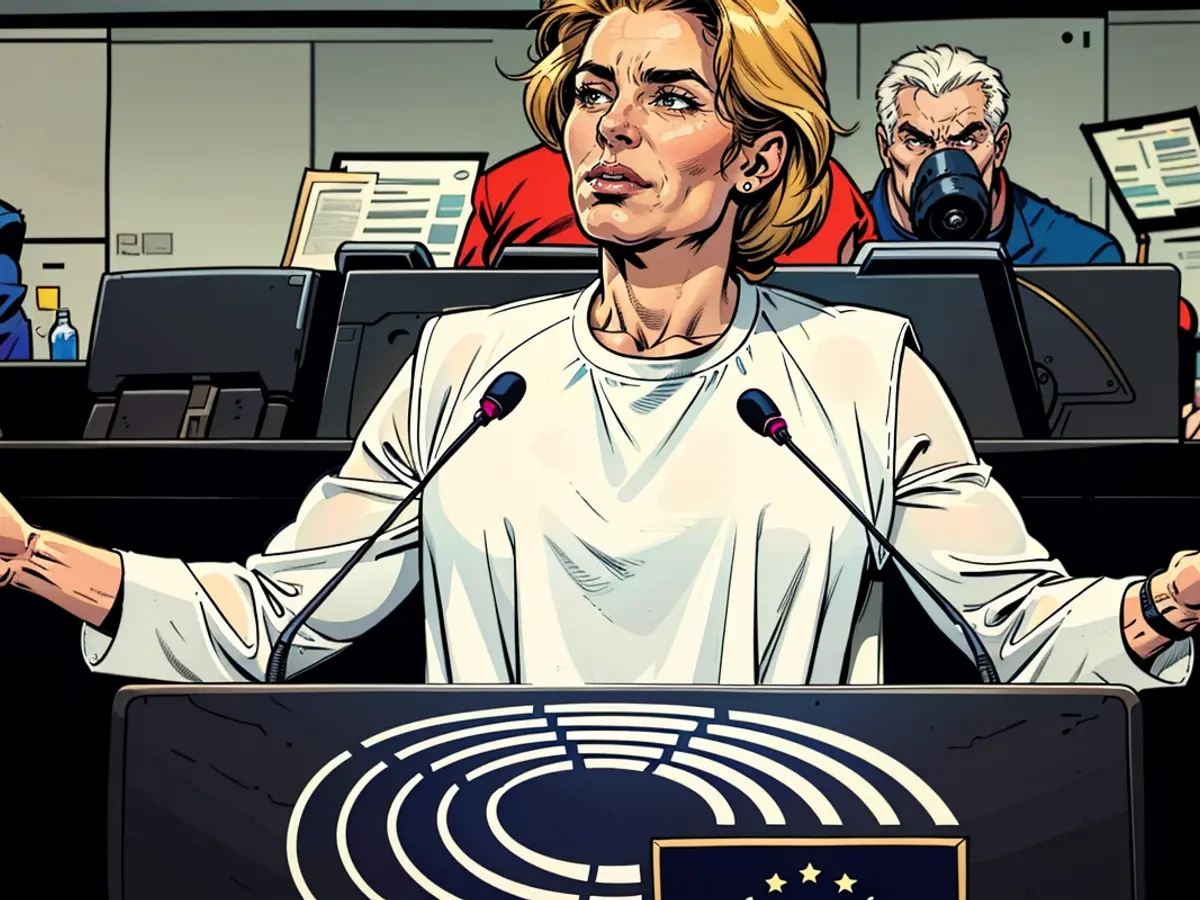Von der Leyen campaigns for "strong Europe" and sharply criticizes Orban
"I will never accept that demagogues and extremists destroy our European way of life," said von der Leyen in her almost unprecedented speech before the EU-MPs. The far-right faction emerged clearly from the European elections at the beginning of June, accounting for roughly one in four of the 720 MPs. Cooperation with the ultraright Italian prime minister Giorgia Meloni had not been excluded by von der Leyen prior to this.
Sharp criticism came from von der Leyen regarding the journey of the Hungarian prime minister Viktor Orban to Russia's President Vladimir Putin in early July. "This so-called peace mission was nothing more than an appeasement mission," she said, alluding to the British appeasement policy towards Adolf Hitler before World War II. Hungary has held the EU Council presidency in the first half of the year, but Orban had not obtained a mandate from the 26 other member states for his trip.
In the face of Russia's aggression in Ukraine, von der Leyen advocated for building a "real European Union of Defense" as French President Emmanuel Macron had demanded. The EU should invest more in its security for this purpose. NATO would remain "the foundation of our collective defense," she said, addressing demands from Germany.
Previously, von der Leyen had already announced that she would appoint an EU commissioner for defense if re-elected. This is also indicated in the political guidelines she published before the vote on Thursday.
In these guidelines, she also calls for the creation of an "European Defense Fund" to invest in military technology. France is demanding new common debts, as was the case in the Corona pandemic. Chancellor Olaf Scholz (SPD) and Finance Minister Christian Lindner (FDP) reject this decisively.
In asylum and refugee policy, von der Leyen advocated for a harder line, as her European People's Party (EVP) had demanded. Returns of migrants without asylum chances should be accelerated, and the number of staff at the European Border and Coast Guard Agency Frontex should be tripled to 30,000, it says there. Europol should become a "real" police authority with twice as many employees.
Beyond this, von der Leyen advocated for treaty changes to make the EU more agile in taking in new countries. The background are ongoing accession negotiations with Ukraine and other states. Germany and most other member states are against treaty changes, as this would mean years of discussions and referendums in several member states.
The MPs in the European Parliament are voting in the early afternoon on a five-year mandate for von der Leyen. She needs an absolute majority of 361 votes. Overwhelmingly positive reactions came from Conservatives, Social Democrats, Liberals, and Greens to her speech. The Left faction and most right-wing populists plan to vote against her.
- Despite criticism from some, European Commission President Ursula von der Leyen maintains her stance against extremism, citing the past and the current rise of figures like Viktor Orban in Hungary and Giorgia Meloni in Italy.
- Von der Leyen's application speech before EU-MPs highlighted the importance of upholding European values, drawing parallels to the appeasement of Adolf Hitler by some leaders prior to the Second World War.
- The strong showing of far-right parties in the European election, including Orban's Fidesz in Hungary and Meloni's Brothers of Italy in Italy, has prompted discussions about potential cooperation within the EU.
- Orban's meeting with Russian President Vladimir Putin in July was met with disapproval from von der Leyen, who viewed it as an attempt to appease Putin's aggression in Ukraine.
- The EU is exploring the creation of a "European Union of Defense" following Russia's actions in Ukraine, with von der Leyen advocating for increased investment in security and defense capabilities.
- Von der Leyen has expressed the intention to appoint an EU commissioner for defense if re-elected, with the political guidelines she published outlining a plan for a European Defense Fund.
- Germany, led by Chancellor Olaf Scholz and Finance Minister Christian Lindner, has expressed opposition to France's calls for new common debts, as was the case during the coronavirus pandemic.
- Asylum and refugee policy has become a contentious issue within the EU, with von der Leyen advocating for tougher measures, such as accelerated returns of migrants without asylum and expanded staff for Frontex and Europol.
- The process of potentially admitting new countries into the EU, such as Ukraine, has sparked discussions about treaty changes, with many member states, including Germany, expressing resistance due to the lengthy negotiations and referendums that would be required.
- The right-wing populists, including Orban's Fidesz, have announced their intention to vote against von der Leyen's re-election, while the Left and other traditional parties have largely praised her speech and policies.







